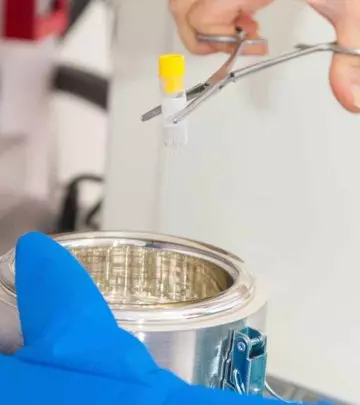
Image: iStock
In October 2014, Apple and Facebook came forward in a big way by their willingness to initiate cryopreserving eggs of their female employees. Cryopreserving or freezing eggs has been popular off late with many celebrities adopting the procedure.
Recently Diana Hayden was able to conceive her daughter Arya at 42 through frozen eggs. Diana was 34 when she approached her doctor to discuss childbirth options. It was the foresight eight years ago that made Diana take the right choice and be able to conceive despite having uterine complications, namely, endometriosis.
Ms. Hayden, who married Collin Dick in 2013 had 16 of her eggs cryopreserved during October 2007 and March 2008. With her daughter being born early this January, Diana has once again gained spotlight. But she also stands as an example for several other women who might want to consider cryopreserving their eggs due to problems in conceiving a child or purely as an option.
Here are few pointers that might help you understand the procedure right from freezing your eggs to conceiving a baby:
What Is Cryopreservation Of Eggs
Cryopreservation of eggs is a process of preserving the eggs by freezing them at sub-zero temperatures thereby preventing any damage to the eggs caused by enzymes or any chemical activity. The preservation might require the use of cryoprotectants.
What’s The Process Involved In Cryopreservation Of Eggs?
- The ovaries are injected with hormones for 9 to 12 days to allow generation of multiple eggs. The whole process is controlled by a transvaginal sonography while also monitoring the hormonal levels.
- The eggs once formed are extracted from the body while administering general anaesthesia to the patient.
- After extraction, the mature eggs are frozen at -196 degrees Celsius. Usually, a lot of 15-20 eggs are preserved at a time. With such preservation the eggs are conditioned in good quality for a very long time, say 10 or more years.
- Freezing of the eggs involves dehydrating the eggs. The water inside the eggs is substituted with antifreeze to avoid the formation of ice crystals. It enables maintaining the eggs for so long.
- The shell of the egg hardens due to freezing. Therefore, the eggs must be fertilized by injecting them with sperms through a needle. The procedure is called Intracytoplasmic Sperm Injection. It enables the fertilization of eggs.
Who Is Suitable To Cryopreserve Their Eggs?
The best age for women to freeze their eggs is between 20 and 30 years because this is the period when their eggs are healthier than later in life. Cryopreservation is, however, most carried out in cancer patients. However, those with critical illnesses are first assessed for cryopreservation depending on their age and the ovarian reserve they have which is revealed by Serum AMH test or transvaginal sonography that can give the antral follicle count.
How Does The Egg Count Vary With Age
For one in her twenties, about 15 to 25 eggs are obtained, of which 3 to 4 eggs are needed to produce a baby. If you are in your late thirties, then you couldn’t expect more than 10 eggs extracted. This apart, you may need 20 to 25 eggs to produce a baby because most of the extracted eggs are likely to damage during thawing! This would mean stimulating egg extraction multiple times that would be cumbersome and economically unviable for the patient.
Frozen Eggs vs. IVF
IVF or in vitro fertilization is different in that while mature eggs are exposed to sperms under lab conditions for the formation of the embryo which is used to attain pregnancy, in egg cryopreservation, only the eggs are extracted and frozen for preservation. The retrieval of embryos might be better than egg cryopreservation in most cases, but the latter might be a more suitable option in the rest.
Pros Of Egg Cryopreservation
- Has an advantage for infertile couples, single parents, cancer patients, aged couples or those going through second infertility.
- Women can conceive with their egg at a later stage in life.
- Suitable for those who cannot compromise on career options due to childbearing. Therefore, it overcomes the biological clock barrier.
Cons Of Egg Cryopreservation
- A safe storage of only between 60 to 70 percent of the eggs is assured. There might be a loss of 30 to 40 percent of the eggs.
- It’s a very expensive procedure. The entire process is quite expensive with initial ovary stimulation, egg extraction with maintenance charges per annum for the eggs.
- The average chance of successful pregnancy either through ICSI or IVF is 45 to 50 percent.












